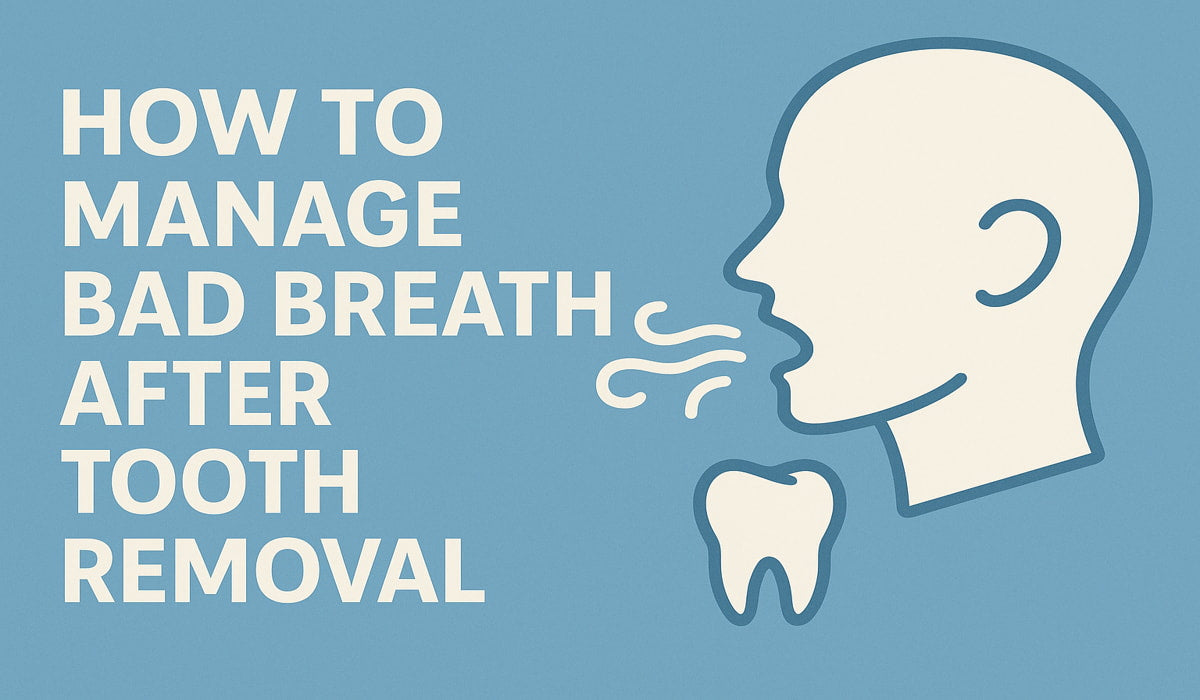Getting a tooth pulled can be a big relief, but let’s be honest, no one wants bad breath as a parting gift. If you’ve noticed an unpleasant odour after your tooth extraction, you’re not alone. It’s one of the most common (and frustrating) side effects during recovery.
The good news? It’s usually temporary and manageable. In this article, we’ll explore why bad breath happens after a tooth removal, what’s normal and the simple steps you can take to keep your mouth feeling clean, fresh and on track for healing.
Why Does Bad Breath Occur After Tooth Removal?
There are several reasons why you might experience bad breath (halitosis) in the days following a dental extraction:
1. Dry Socket
A dry socket occurs when the blood clot that forms in the socket becomes dislodged or fails to form properly. This can expose the bone and nerves beneath, leading to a strong odour and unpleasant taste.
2. Food Debris
During healing, it’s easy for food particles to get trapped in or around the extraction site, especially in the first few days when cleaning is more limited. This can lead to bacterial buildup and a noticeable smell.
3. Bacterial Activity
With limited brushing and rinsing around the area, bacteria can multiply, leading to a temporary increase in bad breath.
4. Medications and Inflammation
Certain medications (like antibiotics or painkillers) and the body’s natural healing response can affect saliva flow and increase the chance of halitosis.
How Long Does Bad Breath Last After Tooth Extraction?
For most people, mild bad breath lasts for 2–5 days and gradually improves as the site begins to heal. However, if you experience persistent foul odour, pain or discharge after a week, it may indicate an infection or dry socket, and you should contact your dentist immediately.
How to Manage Bad Breath After a Tooth Extraction
At BreezeCare, we recommend the following tips to manage and minimise bad breath after a tooth removal:
1. Rinse Gently with Salt Water
Start rinsing 24 hours after your extraction using warm salt water. Do this gently after meals to keep the site clean and reduce odour-causing bacteria.
How to do it: Mix half a teaspoon of salt into a glass of warm water and swish gently. Do not spit forcefully.
2. Avoid Smoking and Alcohol
Smoking can delay healing, increase your risk of dry socket and worsen mouth odour. Alcohol also interferes with healing and dries out the mouth.
3. Maintain Good Oral Hygiene
While you’ll need to be gentle around the extraction site, you can still maintain good oral hygiene with a few simple adjustments to your routine:
-
Continue brushing your other teeth carefully.
-
Avoid brushing directly over the extraction site for the first few days.
-
Use a soft-bristled brush and avoid vigorous spitting or rinsing.
4. Stay Hydrated
Dry mouth can contribute to bad breath. Drink plenty of water throughout the day to support saliva flow and flush away bacteria.
5. Watch Your Diet
Stick to soft, bland foods for the first few days and avoid anything that could get stuck in the socket (like nuts, seeds, rice or popcorn).
6. Use a Dentist-Approved Mouth Rinse
Once your dentist advises it’s safe, consider using an antibacterial mouthwash or oral probiotic to freshen your breath and reduce bacteria.
Struggling with bad breath after your tooth extraction? Our KForce Oral Breath products are designed to neutralise odour-causing bacteria and support a fresher, cleaner mouth while you heal.
When to See Your Dentist
While some odour is normal during healing, see your dentist if you notice:
-
Intense or worsening pain
-
Bad breath that doesn’t improve after a week
-
Pus or discharge from the extraction site
-
Fever or signs of infection
These could be signs of a dry socket or post-operative infection, both of which require professional care.
Final Thoughts: A Fresh Recovery Starts with Good Care
Bad breath after a tooth removal is usually temporary and manageable with the right care. By keeping the area clean, avoiding irritants and staying hydrated, you’ll support a smooth recovery and maintain fresher breath throughout the healing process.
At BreezeCare, we’re here to support your post-extraction recovery. If you’re concerned about your healing or have ongoing bad breath after a procedure, book a follow-up appointment with our friendly dental team.











